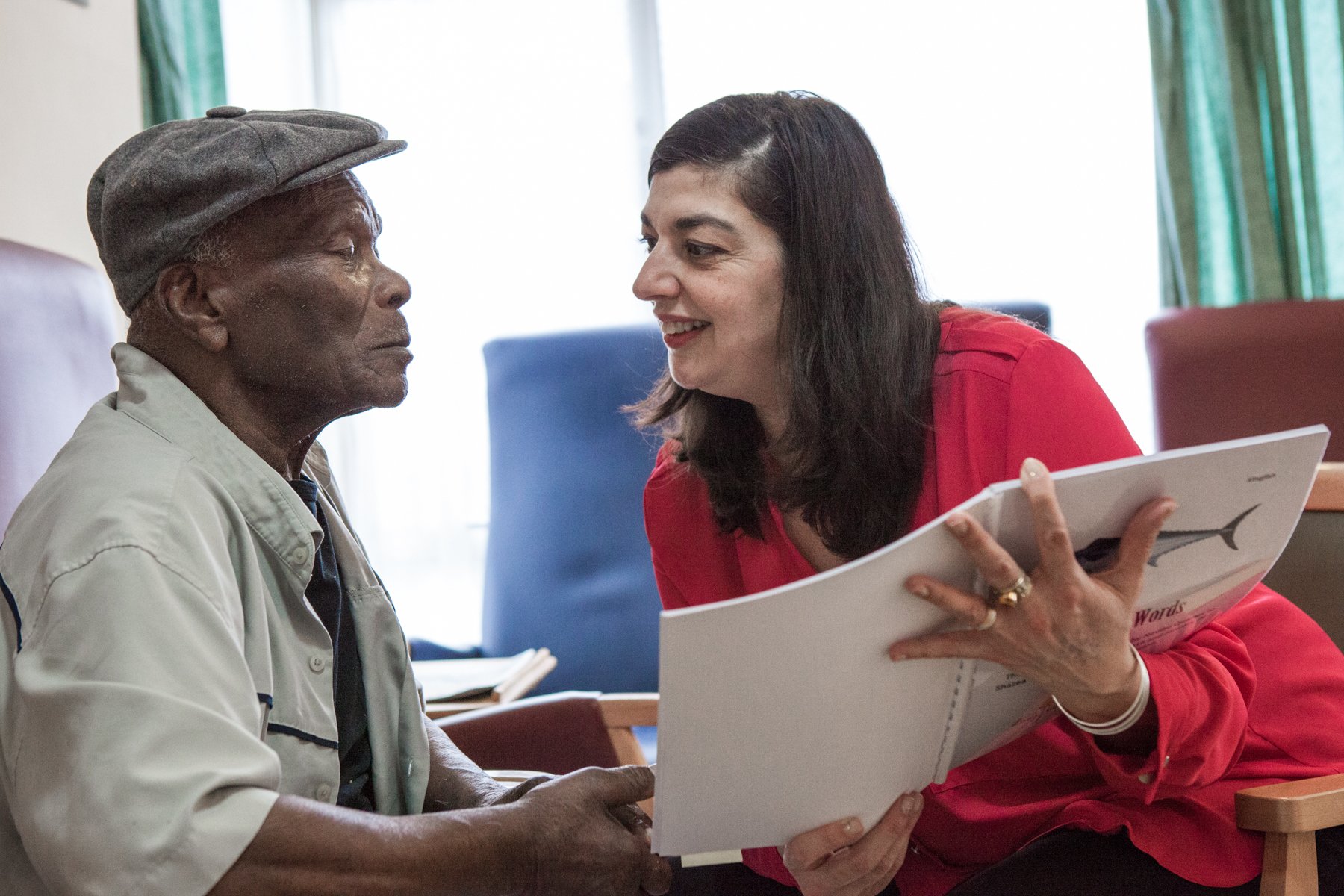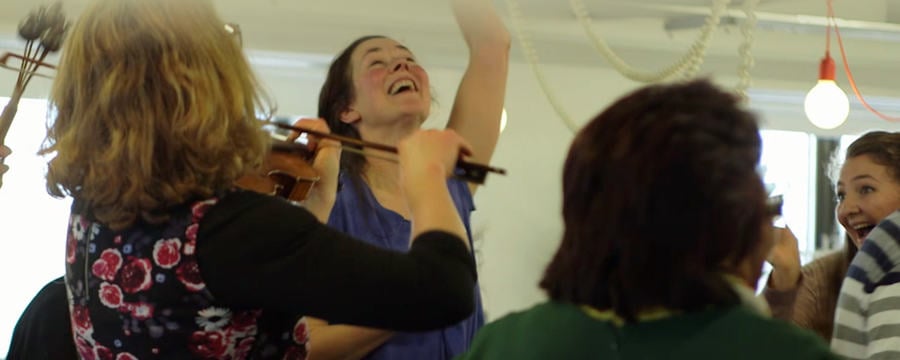Challenges of engaging people with advanced dementia

Share this step
Written by Susanna Howard, Founder & Artistic Director of Living Words.
This article is written with artists in mind, but if you are a carer, volunteer or work in a nursing home it is still of relevance.
It is important that as artists, we always have the beginner’s mindset, and do not make assumptions about places and people based on past experiences. From the moment that you enter the care home employ every aspect of your listening self. This means having a clear mind, feeling no judgment and employing an openness and validatory quality. You are about to work with people who may have a very different relationship to time, both to each other as well as to staff.
Environment
Working one to one in communal spaces can be a challenge. A participant might speak very loudly, or another resident may feel left out by you not working with them in that moment. It is important that you have clear boundaries as well as an open heart, and communicate to the person. For example on a residency when a participant and I were working together a resident who was not part of the project (at that time) started saying ‘I don’t have a book, book, book. I have words, I have words…’, whilst another started saying ‘I love her. Look she understands, my goodness, she understands, come here, come here’. As an artist you need to be prepared for this, and have structures in place to help with any overwhelm that could take place. Think and plan ahead for these interjections.
Tea and cake times can challenge the creative process. It is often best to take a break with the participant at that point rather than integrating the tea and cake into the creative process, as it can muddy the boundaries of practice.
If you are working with someone in their own home you may face the challenge of a relative wanting to ‘sit in’ at first. This is totally understandable as they want to know their relative is safe with you, and they also want to see if it is worthwhile. Validate the relative, show them your DBS if you feel necessary and tell them about similar work. We suggest people call other relatives from one-to-ones to have a chat about how the work with their relative has gone. Again preparation is your ally and enables you to respond authentically and know your boundaries.
Expectations
Often people think of arts activity as an outcome – people want to know what the final artwork will be. I believe that focussing on outcome disrupts the process of creation, but by focussing on the process, the outcome will naturally come forward. Working with people experiencing advanced dementia is no different. It may be important to lower care home expectations around what the outcome will look like; continue discussing the process rather than the outcome. This can also be aided by staff observation measures taken before and after interventions – simple questions asking staff members to comment on how the participant was before and then after the session. This can help staff to separate the process from the product, and see the effect of each intervention.
At Living Words we like to promote the work for people who are more isolated within the home setting. Communicating this can be a challenge when staff members can see the benefit of the work with residents they know ‘like’ taking part in activities. Staff are often helpful by suggesting people they know will likely produce end results. Arm yourself with examples of working with isolated and quieter participants. The staff are your allies and you must earn their respect and trust. Never go into a home expecting it. The staff know the residents you will be working with exceptionally well, and want the very best for them. Take time – as often as possible – to explain your work and what you are doing to staff members.
We have had relatives say to us before a project ‘I am afraid that what you are proposing is a fool’s errand’, or ‘Dad doesn’t speak, he’s gone. You are wasting your time’. You will encounter this.
Modes of communication
You are there to be empathetic, not sympathetic. But remember – we are artists, not therapists and the focus is always on the creative expression. As a beginner, make sure you have support when doing this, and discuss subsequently in supervision.
Sometimes you may find that the person you are working with falls asleep during a session! You have a choice here of whether to wake the person or let them be. Your relationship with that person will help determine which is the best approach to take. We would stay a while, validate out loud that the person is resting, end the session as normal and slowly leave, to return again once the person has woken up. Sessions can be very tiring sometimes for participants, and one of the benefits can be improved sleep.
Participants with advanced dementia will not necessarily recognise you personally, even if they are responding to you as they recognise the connection with you. Even within a session your identity might shift for that person. Take this as a given. Your job is to not take that personally. Don’t be afraid to spell out that you are the artists/person they are waiting for. Throughout our work we restate what we are doing together, stating in a matter of fact way. Often a person will say something like ‘I didn’t know we were doing that. I don’t remember’ and we say ‘Well, that’s my job, that’s what I am here for – I have our work right here. Shall we look at it?’
There is so much more I can say about the challenges of engaging people with advanced dementia in arts-based practices. There will never not be challenges. You will never ‘work it out’. This is just a start, that I hope will encourage you to develop your practice. As artists you will learn so much that can affect your personal artistic practice, from working this way. But remember – you will learn so much more than you give. You are not the big ‘I am’ artist, regardless of your fame or reach elsewhere. You are a human being, meeting other human beings – and employing your artistic self, seeing what happens.
Share this
Dementia and the Arts: Sharing Practice, Developing Understanding and Enhancing Lives

Dementia and the Arts: Sharing Practice, Developing Understanding and Enhancing Lives


Reach your personal and professional goals
Unlock access to hundreds of expert online courses and degrees from top universities and educators to gain accredited qualifications and professional CV-building certificates.
Join over 18 million learners to launch, switch or build upon your career, all at your own pace, across a wide range of topic areas.
Register to receive updates
-
Create an account to receive our newsletter, course recommendations and promotions.
Register for free







